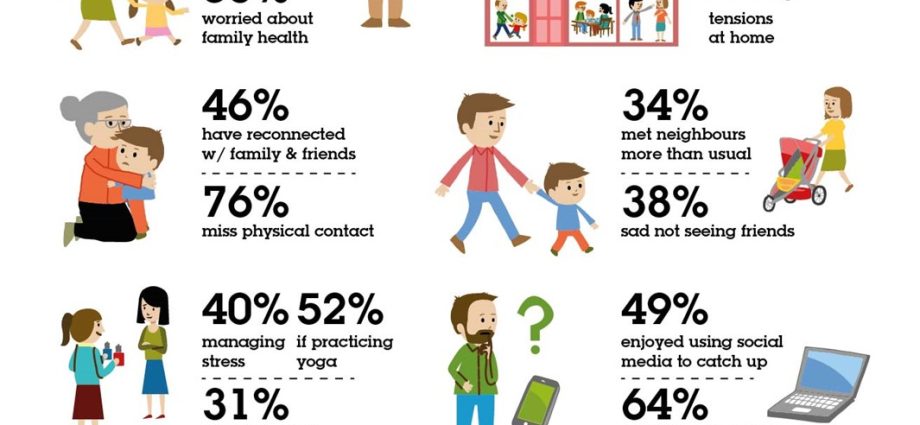A study in Canada highlights another negative consequence of the pandemic for children and adolescents. The results of the study indicate that in 2020 the number of eating disorders and hospitalization of young people increased sharply.
- The pandemic has caused a worsening of mental health problems among teenagers
- Isolation, a change in daily routine and the news of “pandemic” weight gain coming from all over could induce or aggravate eating disorders in children
- The results of this latest study show that the number of new diagnoses of anorexia has doubled during the first wave of the COVID-19 pandemic. On the other hand, the hospitalization rate almost tripled
- More research is needed to prepare for children’s eating disorder needs in the event of future pandemics or prolonged social isolation
- Thông tin thêm có thể được tìm thấy trên trang chủ của TvoiLokony
The study, published on December 7 in the medical journal JAMA Network Open, was conducted in six Canadian pediatric hospitals. Scientists aimed to assess the frequency and severity of the newly diagnosed anorexia nervosa (anorexia). The results of the study indicate that the number of new diagnoses of anorexia has doubled during the first wave of the COVID-19 pandemic. On the other hand, the hospitalization rate among these patients was almost three times higher than in the years before the pandemic.
- Đại dịch đã có tác động đến trạng thái tinh thần của trẻ em. "Tình hình đã tồi tệ và bây giờ nó sẽ còn tồi tệ hơn"
How did the pandemic affect the mental state of young people?
The COVID-19 pandemic has taken away our everyday lives. Adults and children were locked in homes, which were not always safe and friendly places for them. The pandemic situation caused the growing problems among adolescents of mood disorders, anxiety, depression, self-harm, suicidal thoughts, as well as reaching for alcohol and other psychoactive substances.
The study also shows that the deterioration of mental health may have contributed to the development of anorexia in some children. The rhythm of meals, exercise, sleep and contacts with friends was disturbed. According to Dr. Holly Agostino, head of the eating disorder program at Montreal Children’s Hospital, vulnerable children and teens may have turned to food restriction as depression and anxiety often overlap with eating disorders.
“I think a lot of it had to do with the fact that we took the kids’ daily activities,” Agostino told WebMD.
Dr. Natalie Prohaska of CS Mott Children’s Hospital agreed that severe disruptions to children’s normal routines have likely contributed to the increase in eating disorders. For many of them, the pandemic has triggered the problem as eating disorders take time. Prohaska also points out that news of the pandemic weight gain could have contributed to the current situation.
- Rối loạn ăn uống - loại, nguyên nhân, triệu chứng, yếu tố nguy cơ, cách điều trị
Observations made in Canada
A cross-sectional study was conducted in six Canadian pediatric hospitals and included 1 patients. 883 children aged 9 to 18 with newly diagnosed anorexia nervosa or atypical anorexia nervosa. Agostino’s team looked at the changes occurring between March 2020 (when the pandemic constraints appeared) and November 2020. They then compared the data with the years before the pandemic, going back to 2015.
The study found that hospitals recorded an average of 41 new cases of anorexia per month during the pandemic, compared with around 25 in the pre-pandemic period. The number of hospitalizations among these patients also increased. In 2020, there were 20 hospitalizations per month, compared to around eight in the previous years. During the first wave of the pandemic, the onset of the disease was much faster and the severity of the disease was greater than before the pandemic.
Bạn có muốn kiểm tra khả năng miễn dịch COVID-19 của mình sau khi tiêm chủng không? Bạn đã bị nhiễm bệnh và muốn kiểm tra mức độ kháng thể của mình? Xem gói kiểm tra khả năng miễn nhiễm COVID-19 mà bạn sẽ thực hiện tại các điểm mạng Chẩn đoán.
Those struggling with abnormal body image, anxiety, or other mental health issues prior to the pandemic, have reached a tipping point during the pandemic. Agostino emphasizes that the number of people waiting to be included in the eating disorder program is getting longer. On the other hand, the results of the conducted research suggest the need to extend services related to eating disorders.
However, it is not known what effect return to school will have on children and adolescents. Research is also needed to better understand the factors and prognosis of eating disorder patients and to prepare for their mental health needs in the event of future pandemics or prolonged social isolation.
Ngoài ra đọc:
- The symptoms of Omicron in children may be unusual
- Các biến chứng đáng ngạc nhiên và nghiêm trọng ở trẻ em bị COVID-19 không có triệu chứng
- Không có trẻ “quá nhỏ” biếng ăn
Nội dung của trang web medTvoiLokony nhằm mục đích cải thiện, không thay thế, mối liên hệ giữa Người sử dụng trang web và bác sĩ của họ. Trang web chỉ dành cho mục đích thông tin và giáo dục. Trước khi thực hiện theo các kiến thức chuyên khoa, cụ thể là lời khuyên y tế, có trên Trang web của chúng tôi, bạn phải tham khảo ý kiến bác sĩ. Ban quản trị không chịu bất kỳ hậu quả nào do việc sử dụng thông tin trên Trang web. Bạn có cần tư vấn y tế hoặc đơn thuốc điện tử không? Truy cập halodoctor.pl, nơi bạn sẽ nhận được trợ giúp trực tuyến - nhanh chóng, an toàn và không cần rời khỏi nhà của bạn.










